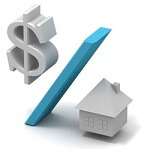 If you are a landlord and real estate investor with, say, 4-5 rental properties with mortgages, and you have an extra $1,000/month you want to put to good use, should you pay down your mortgages faster or invest in another rental property? Like most questions worth asking, the answer is “It depends.”
If you are a landlord and real estate investor with, say, 4-5 rental properties with mortgages, and you have an extra $1,000/month you want to put to good use, should you pay down your mortgages faster or invest in another rental property? Like most questions worth asking, the answer is “It depends.”
Examine Rental Investments Existing Mortgages
How high are your interest rates, both for your existing mortgages and potential new ones? At 12%, the cost in interest will likely outweigh the return on investment (ROI) from another rental property, so in most cases it would make more sense to pay off the old mortgages and rid yourself of the expense. At 5% interest the math is more favorable, and a well-chosen new rental investment is often the more profitable use for your cash. And, of course, if the old interest rate is very high, perhaps a refinance to a much-lower one is in order, potentially with enough cash out to finance the purchase of a new free-and-clear rental investment!
Compare Sales Market Against Rental Market
How is the sales market versus the rental market? If local cap rates are high, and you can buy low and rent high (as conditions were in 2012 and remain in many markets), then use the extra cash to expand your rental portfolio. When real estate prices are high and/or dropping (as was the case from 2006-2011 in most U.S. markets), it makes far more sense to pay down your mortgages with the extra cash, rather than overspend on a new investment property.
Tax Benefits of Paying Down Loan vs. Buying New Properties
Aside from the more obvious factors above, there are also several hidden costs and benefits associated with both options. Mortgage interest is a tax-deductible expense, so the real cost is substantially offset by the reduced tax liability. For every dollar you have to pay in interest to the bank, you might be saving 40 cents in taxes on unearned profits to Uncle Sam. And using your cash on a down payment on a new property comes with its own set of tax benefits – the new property can be depreciated for paper losses, the new interest payments can be used to offset tax liability, etc.
What About Asset Protection?
If your rental properties are in a particularly litigious area, there are asset protection benefits to keeping high mortgages on the properties as well. Many lawyers earn their living by encouraging tenants to sue their landlord, but before they go through the trouble, they will often first do a cursory check to see whether the landlord has assets worth taking. The first place they will look is at the rental property itself – if it is worth $90,000 and has an $80,000 mortgage, there is nothing for the lawyer to take, as it would cost more to collect than there is equity in the property.
Factoring in Mortgage Interest Calculations & Payments
Paying down mortgages early has its advantages too. However, mortgage interest calculation is based on what's known as “simple interest amortization,” which is anything but simple. The important thing to know is that percentage of your monthly payment that goes to principal versus interest changes from month to month, with much more interest being charged in the beginning of the loan than at the end. As the principal balance shrinks, the percentage of your monthly payment that goes towards interest also shrinks, while the portion going to principal grows. So the lower your principal balance, the faster your payments pay it down even further, and not linearly but exponentially.
Goal of Landlording is Passive Income
And to come full circle to why one might pay down their mortgages in the first place, the whole point of being a landlord is passive income, right? The sooner rental properties are paid off, the sooner the landlord starts pocketing most of the rent instead of passing it along to the bank. The annual ROI will leap upward, and remain high indefinitely. A landlord with 4-5 free-and-clear rental properties may well be able to quit their day job and exit the rat race entirely.




We love your feedback and welcome your comments.
Please post below: